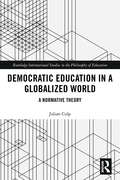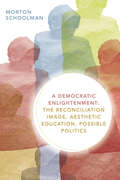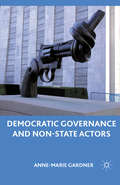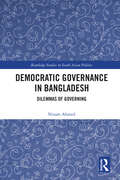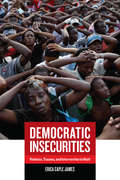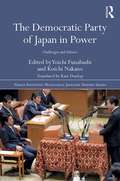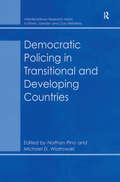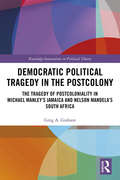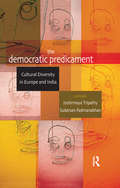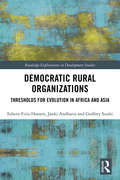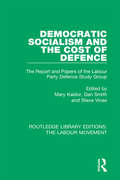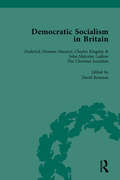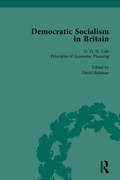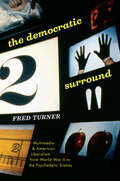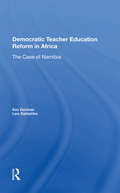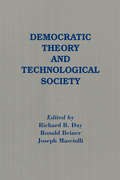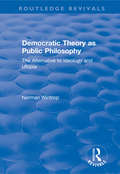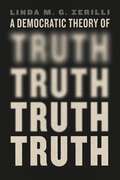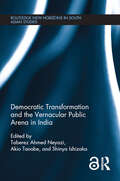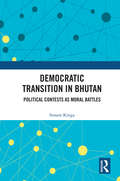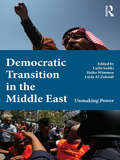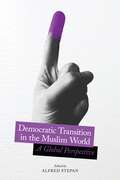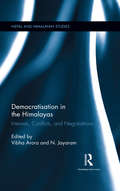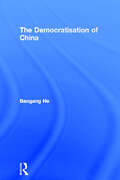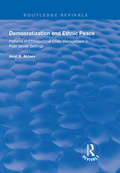- Table View
- List View
Democratic Education in a Globalized World: A Normative Theory (Routledge International Studies in the Philosophy of Education)
by Julian CulpDue to the economic and social effects of globalization democracy is currently in crisis in many states around the world. This book suggests that solving this crisis requires rethinking democratic education. It argues that educational public policy must cultivate democratic relationships not only within but also across and between states, and that such policy must empower citizens to exercise democratic control in domestic as well as in inter- and transnational politics. Democratic Education in a Globalized World articulates and defends democratic conceptions of global citizenship education and educational justice on the basis of a democratic understanding of global justice. It will be of interest to researchers across the fields of education, political theory, philosophy, development and postcolonial studies.
A Democratic Enlightenment: The Reconciliation Image, Aesthetic Education, Possible Politics
by Morton SchoolmanIn A Democratic Enlightenment Morton Schoolman proposes aesthetic education through film as a way to redress the political violence inflicted on difference that society constructs as its racialized, gendered, Semitic, and sexualized other. Drawing on Voltaire, Diderot, and Schiller, Schoolman reconstructs the genealogical history of what he calls the reconciliation image—a visual model of a democratic ideal of reconciliation he then theorizes through Whitman's prose and poetry and Adorno's aesthetic theory. Analyzing The Help (2011) and Gentleman's Agreement (1947), Schoolman shows how film produces a more advanced image of reconciliation than those originally created by modernist artworks. Each film depicts violence toward racial and ethnic difference while also displaying a reconciliation image that aesthetically educates the public about how the violence of constructing difference as otherness can be overcome. Mounting a democratic enlightenment, the reconciliation image in film illuminates a possible politics for challenging the rise of nationalism's violence toward differences in all their diversity.
Democratic Governance and Non-State Actors
by Anne-Marie GardnerThis book investigates whether international standards of good governance are applied to sub-state actors as well as to states. By examining the international response to self-determination claims, this project demonstrates that the international community does indeed hold sub-state groups accountable to such standards.
Democratic Governance in Bangladesh: Dilemmas of Governing (Routledge Studies in South Asian Politics)
by Nizam AhmedThis book explores the role of government in the governing process of Bangladesh. It primarily focuses on the dilemmas and constraints faced by the successive democratic governments elected since the early 1990s. Bangladesh has had a new democratic beginning since the early 1990s and formally remained a democracy for the last the three decades. Despite impressive performance in the economic and social fields, the country has lagged far behind most of the new democracies in the political realm. This book identifies how representative institutions of governance have gradually declined under democratic governments in Bangladesh, and how disagreements on the ‘basic rules of the game’ have made the task of governing extremely difficult and democratic consolidation problematic. This book is a significant and comprehensive analysis that identifies and explains the implications of the crises in governance for democratic consolidation in Bangladesh. It will be of interest to academics studying Area Studies, in particular South Asian Studies, and the increasingly researched areas of governance, public policy, and administration.
Democratic Insecurities: Violence, Trauma, and Intervention in Haiti
by Erica Caple JamesDemocratic Insecurities focuses on the ethics of military and humanitarian intervention in Haiti during and after Haiti's 1991 coup. In this remarkable ethnography of violence, Erica Caple James explores the traumas of Haitian victims whose experiences were denied by U.S. officials and recognized only selectively by other humanitarian providers. Using vivid first-person accounts from women survivors, James raises important new questions about humanitarian aid, structural violence, and political insecurity. She discusses the politics of postconflict assistance to Haiti and the challenges of promoting democracy, human rights, and justice in societies that experience chronic insecurity. Similarly, she finds that efforts to promote political development and psychosocial rehabilitation may fail because of competition, strife, and corruption among the individuals and institutions that implement such initiatives.
The Democratic Party of Japan in Power: Challenges and Failures (Nissan Institute/Routledge Japanese Studies)
by Yoichi Funabashi Koichi NakanoWhen the Democratic Party of Japan (DPJ) came to power in September 2009, Japanese citizens expected the imminent arrival of a new political era, characterized by a two-party system. However, in addition to the triple disasters of March 2011, the DPJ faced numerous difficulties arising from its controversial policies and massive party defections following the government’s consumption tax hike legislation. The DPJ fell from power following a crushing defeat in the 2012 Lower House election, in which its seat total was drastically reduced.This book examines the September 2009-December 2012 administration of the DPJ from various perspectives, including policies, party governance, management, and legacy. It identifies the significance of the DPJ to Japan’s party politics, explains the reasons for its downfall, and derives crucial lessons for the future of party democracy in Japan. The contributors, a team of professional academics and a lawyer, analyse the policies and events of the DPJ administration based on their interviews with key DPJ politicians and related persons at or close to the centre of the administration. Together they elicit insights from the experiences of the DPJ government to inform the expectations of Japan’s party democracy. Explaining how the failure of the DPJ government has long-term importance for understanding Japanese politics, this book will be invaluable for students and scholars of the field.
Democratic Policing in Transitional and Developing Countries
by Michael D. WiatrowskiIs it possible to create democratic forms of policing in transitional and developing societies? This volume argues that policing models and practices promoted by the west are often inadequate for adoption by countries making democratic transitions because they do not adequately address issues such as human rights, equity, co-production, accountability, openness and organizational change. Therefore police reform is often limited to a "one size fits all" approach. The book expands the dialogue so that discussions of democratic policing around the world are more realistic, comprehensive and sensitive to the local context. Detailed case studies on Iraq, South Africa, Northern Ireland and Kazakhstan provide a realistic assessment of the current state of policing. The editors use the studies to suggest how to promote democratic policing and other important goals of democratic reform around the world. The volume will assist academics, policy makers, NGOs and others in tailoring a local democratic policing strategy within a broader framework to enhance socioeconomic development and citizen capacity, build social capital, reduce various forms of conflict and support human rights.
Democratic Political Tragedy in the Postcolony: The Tragedy of Postcoloniality in Michael Manley’s Jamaica and Nelson Mandela’s South Africa (Routledge Innovations in Political Theory)
by Greg A. GrahamA ground-breaking work in Africana political thought that links the plight of progressive political endeavors in Africa with those in the Diaspora and beyond, Democratic Tragedy in the Postcolony engages with two of the defining political sagas of the postcolonial era. The book presents Michael Manley of Jamaica and Nelson Mandela of South Africa as tragic political leaders at the helm of popular democratic projects that run aground in the face of the constraints that a subordinate position in the global economy presents for such endeavors. Jamaica’s experiment with democratic socialism as an alternative path to development at the height of the cold war is considered alongside post-Apartheid South Africa’s search for a development model consistent with the demand for civic empowerment and equitable distribution of social goods in the aftermath of Apartheid. Democratic Political Tragedy in the Postcolony theorizes the defining tragic impasse and the telling vacillations by which the postcolonies in question are brought to the neoliberal catastrophes that currently prevail.
The Democratic Predicament: Cultural Diversity in Europe and India
by Jyotirmaya Tripathy Sudarsan PadmanabhanBoth India and Europe have been undergoing a difficult process of negotiating cultural, religious and ethnic diversity within their democratic frameworks. In fact, recent incidents of xenophobic backlash against multiculturalism and minority communities in Europe, as well as myriad movements for constitutional recognition of castes, tribes and languages and the emergence of Islamophobic terror in India, question the conventional idea of democracy as the idyllic preserver of diversity. This volume contests the simplistic connection between democracy and diversity by proposing that democracy, in fact, produces, sediments and reinforces cultural heterogeneity. It argues that in democratic polities, disparate cultural practices are often converted into identity categories, with disturbing implications for national identity, constitutionalism, political governance and citizenship. While mobilizations on the plank of cultural differences are typically viewed as being born in undemocratic spaces with little toleration for diversity, they also find fertile soil in democracy insofar as democracy celebrates diversity and allows cultural dissent to thrive. Such dissent, while essential for democracy, has difficult consequences. Examining the fundamental conflict between constructions of particular cultural identities and mandates of a unifying democratic ethos, the book brings forth the complexities underlying the politics of identity recognition and national integration. In making a radical intervention in the discourse, this volume offers a critique of existing paradigms of multiculturalism. It will interest scholars and students of political science, sociology, and postcolonial and comparative studies.
Democratic Rural Organizations: Thresholds for Evolution in Africa and Asia (Routledge Explorations in Development Studies)
by Esbern Friis-Hansen Janki Andharia Suubi GodfreyDemocratic rural organizations can play an important role in helping their members, who are frequently poor farmers living in the margins of the economy, to escape their disadvantaged starting point and to gain access to financial services, political influence and profitable markets for their product. Democratic Rural Organizations: Thresholds for Evolution in Africa and Asia traces the evolution of democratic rural organizations from small groups to larger, NGO financed, multi-tier democratic rural organizations in recent years. Rural citizens have historically formed democratic organizations by their own initiative, to enhance economic and social wellbeing, but in recent years rural mobilization processes are frequently initiated and supported by national Civil Society Organizations (CSOs), who are financed and guided by international NGOs, a process which has had mixed results. Using rich empirical material from Uganda, India, Bangladesh and Cambodia, Democratic Rural Organizations: Thresholds for Evolution in Africa and Asia identifies eight thresholds which represent practical stages in the development pathway of democratic rural organizations and influence success or failure. Both development practitioners and researchers of development and rural policy will find this book a useful guide to the deployment of democratic organization as a strategy for economic and political empowerment.
Democratic Socialism and the Cost of Defence: The Report and Papers of the Labour Party Defence Study Group (Routledge Library Editions: The Labour Movement #20)
by Mary Kaldor, Dan Smith and Steve VinesFirst published in 1979. The report of the Labour Party Defence Study Group, which met from early 1975 to mid-1977, represents a unique attempt to portray defence policy in the context of disarmament and the need to restructure and control the institutions of defence – in particular the defence industry. The report presented the fullest study made by any British political party concerning the implications and consequences of its stated defence policy, and embodied an examination of defence from the perspective of approaches of disarmament. At the same time, the search for a new policy in international relations was harmonised with the further development of a new industrial strategy, concentrating upon the potential for converting part of military industry to civil work. This work which presents a distinctive intervention in the general debate concerning defence policy, industrial and technological planning, economic priorities and public policy, will be of considerable relevance to both specialists in each of these fields as well as the general reader.
Democratic Socialism in Britain, Vol. 2: Classic Texts in Economic and Political Thought, 1825-1952
by David ReismanThe texts in this collection of 10 volumes demonstrate both the diversity and continuity in British theories of democratic socialism. The selection encompasses the Ricardian socialists, the Christian socialists, and the Fabian socialists. Volume 2 includes contributions from .Frederick Denison, Maurice Charles Kingsley and John Malcolm Ludlow, the ‘Christian Socialists’.
Democratic Socialism in Britain, Vol. 7: Classic Texts in Economic and Political Thought, 1825-1952
by David ReismanThe texts in this collection of 10 volumes demonstrate both the diversity and continuity in British theories of democratic socialism. The selection encompasses the Ricardian socialists, the Christian socialists, and the Fabian socialists. Volume 7 includes ‘Principles of Economic Planning’ by G.D.H.Cole.
The Democratic Surround: Multimedia & American Liberalism from World War II to the Psychedelic Sixties
by Fred TurnerWe commonly think of the psychedelic sixties as an explosion of creative energy and freedom that arose in direct revolt against the social restraint and authoritarian hierarchy of the early Cold War years. Yet, as Fred Turner reveals in The Democratic Surround, the decades that brought us the Korean War and communist witch hunts also witnessed an extraordinary turn toward explicitly democratic, open, and inclusive ideas of communication and with them new, flexible models of social order. Surprisingly, he shows that it was this turn that brought us the revolutionary multimedia and wild-eyed individualism of the 1960s counterculture. In this prequel to his celebrated book From Counterculture to Cyberculture, Turner rewrites the history of postwar America, showing how in the 1940s and '50s American liberalism offered a far more radical social vision than we now remember. Turner tracks the influential mid-century entwining of Bauhaus aesthetics with American social science and psychology. From the Museum of Modern Art in New York to the New Bauhaus in Chicago and Black Mountain College in North Carolina, Turner shows how some of the most well-known artists and intellectuals of the forties developed new models of media, new theories of interpersonal and international collaboration, and new visions of an open, tolerant, and democratic self in direct contrast to the repression and conformity associated with the fascist and communist movements. He then shows how their work shaped some of the most significant media events of the Cold War, including Edward Steichen's Family of Man exhibition, the multimedia performances of John Cage, and, ultimately, the psychedelic Be-Ins of the sixties. Turner demonstrates that by the end of the 1950s this vision of the democratic self and the media built to promote it would actually become part of the mainstream, even shaping American propaganda efforts in Europe. Overturning common misconceptions of these transformational years, The Democratic Surround shows just how much the artistic and social radicalism of the sixties owed to the liberal ideals of Cold War America, a democratic vision that still underlies our hopes for digital media today.
Democratic Teacher Education Reforms In Namibia
by Ken ZeichnerAn analysis of teacher education reforms in Namibia in the post-independence era, from the perspective of government personnel, teacher educators, and teachers themselves. This book examines post-independence teacher education reforms in the southern African country of Namibia from the perspective of various actors in the reform process: Ministry
Democratic Theory and Technological Society
by Joseph Masciulli Richard B. Day Ronald BeinerWhat are the chief challenges posed to contemporary democracy by modern technology, and how can democratic theory best respond to, or at least reflect on, those challenges? Inhabiting the kind of technologically advanced era in which we live, what sources are available within political theory for theoretical insight concerning the problem of democratic engagement with technology? The purpose of this volume is to canvas a broad range of theorists and theoretical traditions in order to address these questions, including Hegel and Marx, Rousseau and John Dewey, Heidegger and Simone Weil, Habermas and Walter Benjamin, Hannah Arendt and Hans Jonas. Commentaries on all these important thinkers -- focused on the issue of contemporary technology as posing unique social and political challenges for democratic political life -- yields rich and ambitious resources for theoretical reflection.
Democratic Theory as Public Philosophy: The Alternative to Ideology and Utopia (Routledge Revivals Ser.)
by Norman WintropThis title was first published in 2000: This text contends that there are pronounced ideological (apologetic) and utopian biases in how democracy is now viewed by most academic writers, politicians and journalists. Ideological biases result from democracy being seen in formal and procedural ways as parliaments, free elections and competitive parties and pressure groups - irrespective of the standards which guide or the effects produced by these procedures. Utopian democrats reject this narrow empiricism for normative approaches and, instead of realistic norms, they offer impractical, perfectionist and counter-productive standards and goals. As the alternative to ideology and utopia, the author builds upon and draws conclusions from a realistic and normative, public philosophic tradition of writing on democratic politics. This tradition is explained and illustrated by critical responses to Walter Lippman's conception of public philosophy, Lippman's activity as a public philosopher, and the work of major democratic theorists from Alexis de Tocqueville to Giovanni Sartori.
A Democratic Theory of Truth
by Linda M. ZerilliA critique of the concept of truth presupposed by the post-truth debate—and a bold new vision for a more pluralistic citizenry. We say that we live in a “post-truth” era because disinformation threatens our confidence in the existence of a shared public world. Affirming objective truth may, therefore, seem necessary to save democracy. According to political theorist Linda M. G. Zerilli, such affirmation can stifle political debate and silence dissent. In fact, Zerilli argues that the unqualified insistence on objective truth is as dangerous for democracy as denying it. Drawing on Arendt, Foucault, and Wittgenstein, A Democratic Theory of Truth challenges the concept of truth presupposed by the post-truth debate. It argues that we, the people, have an essential role in discovering and evaluating any truth relevant to the political realm. The result is a striking defense of plurality, dissent, and opinion in contemporary democratic societies.
Democratic Transformation and the Vernacular Public Arena in India (Routledge New Horizons in South Asian Studies)
by Akio Tanabe Taberez Ahmed Neyazi Shinya IshizakaSince the structural change in Indian society that began in the 1990s - the result of the liberalisation of the economy, devolution of power, and decentralisation of the government–an unprecedented, democratic transformation has been taking place. This has caused the emergence of unexpected coalitions and alliances across diverse castes, classes, and religious groups according to the issues involved. In this volume, we intend to understand this deepening of democracy by employing a new analytical framework of the 'vernacular public arena' where negotiations, dialogues, debates, and contestations occur among 'vernacular publics'. This reflects the profound changes in Indian democracy as diverse social groups, including dalits, adivasis, and Other Backward Classes; minorities, women; individuals from rural areas, towns, and cities; the poor and the new middle classes–the 'vernacular publics'–participate in new ways in India’s public life. This participation is not confined to electoral politics, but has extended to the public arenas in which these groups have begun to raise their voice publicly and to negotiate and engage in dialogue with each other and the wider world. Contributors demonstrate that the participation of vernacular publics has resulted in the broadening of Indian democracy itself which focuses on the ways of governance, improving people’s lives, life chances, and living environments. An original, comprehensive study that furthers our understanding of the unfolding political dynamism and the complex reshuffling and reassembling taking place in Indian society and politics, this book will be relevant to academics with an interest in South Asian Studies from a variety of disciplines, including Political Science, Sociology, Anthropology, and Media Studies.
Democratic Transition in Bhutan: Political Contests as Moral Battles
by Sonam KingaThis book studies how a modern monarchy transformed Bhutan into a parliamentary democracy. A political ethnography, it focuses on the historic elections of 2007–2008, and studies democracy and its transformational processes from the ground up. It draws on historical as well as contemporary theories about kingship and regime change to analyse Bhutan’s nascent democratic process and reflect on the direction of political change, both at the state and local levels in the aftermath of the elections. It also presents insights into the electoral and political process by giving a first-hand account of the author’s own participation in the elections and ponders on the larger political implications of this election for the region. A strong theoretical discussion situated in robust fieldwork and personal experience, this book will be an essential read for scholars and researchers of politics, especially comparative politics and political institutions, South Asian and Himalayan Studies, political sociology and social anthropology.
Democratic Transition in the Middle East: Unmaking Power
by Layla Al-Zubaidi Larbi Sadiki Heiko WimmenPopular uprisings and revolts across the Arab Middle East have often resulted in a democratic faragh or void in power. How society seeks to fill that void, regardless of whether the regime falls or survives, is the common trajectory followed by the seven empirical case studies published here for the first time. This edited volume seeks to unpack the state of the democratic void in three interrelated fields: democracy, legitimacy and social relations. In doing so, the conventional treatment of democratization as a linear, formal, systemic and systematic process is challenged and the power politics of democratic transition reassessed. Through a close examination of case studies focusing on Bahrain, Egypt, Iraq, Lebanon, Syria, and Yemen, this collection introduces the reader to indigenous narratives on how power is wrested and negotiated from the bottom up. It will be of interest to those seeking a fresh perspective on democratization models as well as those seeking to understand the reshaping of the Arab Middle East in the lead-up to the Arab Spring.
Democratic Transition in the Muslim World: A Global Perspective (Religion, Culture, and Public Life #35)
by Edited by Alfred StepanIn early 2011, widespread protests ousted dictatorial regimes in both Tunisia and Egypt. Within a few years, Tunisia successfully held parliamentary and presidential elections and witnessed a peaceful transition of power, while the Egyptian military went on to seize power and institute authoritarian control. What explains the success and failure of transitions to democracy in these two countries, and how might they speak to democratic transition attempts in other Muslim-majority countries?Democratic Transition in the Muslim World convenes leading scholars to consider the implications of democratic success in Tunisia and failure in Egypt in comparative perspective. Alongside case studies of Indonesia, Senegal, and India, contributors analyze similarities and differences among democratizing countries with large Muslim populations, considering universal challenges as well as each nation’s particular obstacles. A central theme is the need to understand the conditions under which it becomes possible to craft pro-democratic coalitions among secularists and Islamists. Essays discuss the dynamics of secularist fears of Islamist electoral success, the role of secular constituencies in authoritarian regimes’ resilience, and the prospects for moderation among both secularist and Islamist political actors. They delve into topics such as the role of the army and foreign military aid, Middle Eastern constitutions, and the role of the Muslim Brotherhood. The book also includes an essay by the founder and president of Tunisia’s Ennadha Party, Rachid Ghannouchi, who discusses the political strategies his party chose to pursue.
Democratisation in the Himalayas: Interests, Conflicts, and Negotiations (Nepal and Himalayan Studies)
by Vibha Arora N. JayaramDemocratisation is a formidable task in the Himalayan region owing to its immense cultural heterogeneity. The process of democratisation has accentuated ethnic competition, assertion of identity, and demand for ethnic homelands to protect, safeguard, and promote political and development interests of various groups. This volume discusses competing interests; identity politics that permeates political formations, the transformations in the traditional forms of governance and their adaption to democratic institutions; the genesis and periodic eruptions of ethnic assertions, and attempts to resolve ethnic conflict. It shows how recent efforts at deepening democratic values and implementing social justice have been resisted and contested. The book argues that the play of ethnicity, the creation of political parties and interest groups, the emergence of social movements, and the voice of protest and opposition do not indicate a crisis in democracy but comprise the instruments by which the state is pushed towards reform, welfare, and inclusive politics, and is obliged to listen to the people. Rich in ethnographic research, this volume will be useful to scholars and researchers of social and political anthropology, political studies, South Asian studies, Nepal and Himalayan studies, sociology, and development studies.
The Democratisation of China (Routledge Studies on China in Transition #Vol. 1)
by Baogang HeThe events of 1989, culminating in Tiananmen Square, highlighted the extent to which democratic ideals had taken root in China. Baogang He traces and evaluates the political discourse of democracy in contemporary China, identifying the three main competing models of democratization that dominate current Chinese intellectual trends. Analyzing the political implications of these models the author considers how the theories may be put into practice in order to develop an appropriately Chinese conception of democracy.
Democratization and Ethnic Peace: Patterns of Ethnopolitical Crisis Management in Post-Soviet Settings (Routledge Revivals)
by Airat R. AklaevFirst published in 1999, this book explores the ethnic dimension of democratic peace agenda in new democracies. The democratic peace proposition concerns the fact that free peoples make good neighbours. How does it apply intra-nationally within multiethnic states? Does the establishment of a constructive and peaceful pattern of ethnic conflict management have anything to do with the type of rule? What tasks and dilemmas must be dealt with in order to promote a more positive and stable relationship of peace in democratizing multiethnic systems? The author searches for answers to these and other topical questions to underscore the linkage between ethnopolitical crises, change and choice... The case study section examines the meanings, articulations, dynamics and character of ethnic peace in four post-Soviet cases (Estonia, Lithuania, Moldova, Russia) with particular focus on areas, factors and patterns of critical choice in the realms of institutions and interactions at the onset and at critical junctions of the democratization dynamic.
